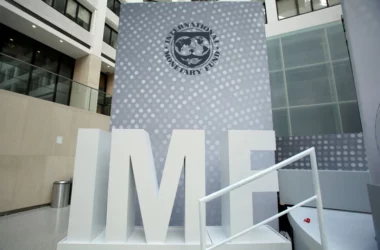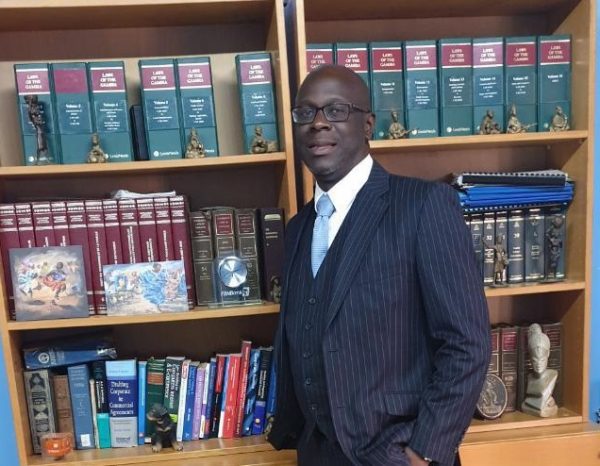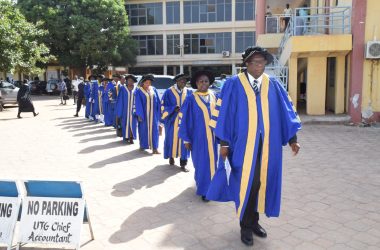
The Gambia’s Bar Association has expressed ‘serious concern’ at President Adama Barrow’s decision to revoke the nomination of Ya Kumba Jaiteh from the country’s National Assembly describing it as ‘unconstitutional and ‘ultra vires’.
The Bar Association said it is of the strong opinion that the executive decision purportedly revoking the nomination of Ms Jaiteh is not in accordance with the 1997 Constitution of the Gambia.
Ms Jaiteh, a UDP member who serve on the Foreign Affairs and the Local Government and Lands Committee of the Assembly, has had her nomination revoked by President Barrow after she publicly laid into him during a political meeting.
No reason was given for the presidential decision but she is believed to be a victim of the ongoing feud between President Barrow and his political godfather, Lawyer Ousainou Darboe.
A letter issued on Monday to Ms Jaiteh by the Secretary General and Head of the Civil Service, Ebrima Camara said: “I write to convey executive decision to revoke your nomination as National Assembly Member with immediate effect.
But the Bar Association said the power vested on the president by the 1997 Constitution is limited to the nomination of five National Assembly Members.
“Furthermore, there is no provision in the Constitution that grants the president, the power or authority to revoke, dismiss, terminate or end the tenure of a nominated or elected member of the National Assembly,” said Salieu Taal, president of the Gambia Bar Association.

“It is pertinent to note that a nominated member of the National Assembly upon taking the prescribed oath, enjoys all the rights, privileges and protection afforded to all members of the National Assembly.
“Therefore, the only legal grounds upon which a nominated National Assembly Member can be removed are stipulated in sections 91 (as amended) and 93 of the Constitution. In the circumstances, the Gambia Bar Association considers the Executive decision purportedly revoking the nomination of Hon. Kumba Jaiteh as unconstitutional and ultra vires.”
The Bar Association reminded the president that a National Assembly Member is not under the purview of the of the Executive by virtue of section 166 (4) (a) of the Constitution.
It said an office in the public service does not include the Offices of President, Vice President, Speaker or Deputy Speaker of the National Assembly, Secretary of State or a Member of the National Assembly (our emphasis).
The Bar Association added: “In light of the aforementioned, the Executive acting through the Secretary General and Head of the Civil Service, has no jurisdiction over any nominated National Assembly Member once they are sworn into office. To this end, the purported revocation is functus officio.”
It ‘strongly’ advised the president to take cognizance of the sacrosanct principle of the separation of powers and respect for the rule of law.
It also reminded the president that his powers are subject to the limits set by the Constitution and him and those acting on his behalf should desist from preventing Ya Kumba Jaiteh from discharging her duties as a member of the National Assembly.















THE FAT BELLY SLEEPING PRESIDENT IS TURNING INTO A HORRIBLE DICTATOR. CAN SOMEBODY PLEASE REMIND THIS FOOL THAT GAMBIANS WILL NEVER AGAIN TOLERATE DICTATORSHIP IN OUR HOMELAND. RESCIND YOUR ILLEGAL REVOCATION OF YA KUMBA’S STATUS AS A MEMBER OF PARLIAMENT. SHAME ON YOU BARROW.
Clearly, there seems to be a lot of of gaps in the understanding of the Separation of Powers that American Democratic Dispensation built in. It is called Checks and Balances. Yes, American Federal judges are appointed by the President in power. That is, if, when and where a vacancy exists. However, and this is the significant difference between the American reality and our nightmare in Africa and Gambia as an example. American Nominated judges must be Confirmed by the relevant Committee (The Judiciary Committee) or entire Senate as in when a judge is Nominated to the Supreme Court. If a President’s Nominee is not Confirmed by the designated Committee or by the Senate, the judge is not Seated, his Nomination is rejected, it is null and void. The significance of the Confirmation Process is to allow the People’s Representatives not just the President’s Executive Power to be applied without the Checks and Balance Provision of the Separation of Powers activate and working in the interest of the People. Through the Confirmation Process, the American people, the Voters are through their Representatives, having their “Say” on the character, qualification, and in case of a judge, the temperament of the Jurist or judge being Nominated. Did such a Confirmation Process take place in the Nominated NAMS? No such thing took place in the Nomination of the individual. Instead of spending time and energy trying to justify an obvious Repugnant Act that the Ruling Parties use to inflate and or undemocratically create a false majority in Parliament or in Gambia’s case, the National Assembly, this act that Adama Barrow has the authority and potentially the power to exercise should be exponged, removed from the Gambian Constitution and all relevant Provisions. Unfortunately, until that is done, Presidents in Gambia and elsewhere where such Repugnant Provisions are embedded in their Constitution would be granted the power to Nominate without Legislative Oversight or Confirmation Process and thus, the open door for Presidents to fire or remove the individual they Nominated. Adama Barrow has not violated any existing Provision in the Gambian Constitution of 1997. Where there is no explicit Constitutional provision prohibiting the President from firing or removing an individual from a position he or she is Nominated to by the President, no reasonable and informed Court should allow itself to be dragged into a “Broad” and Unmitigated interpretation of the Gambian Constitution. Where there is no Provision as in the case at hand, the norm is a “Narrow” interpretation of the Constitution and leave it to the “Law Making Body” in Gambias case the National Assembly to come up with Legislation that would then be submitted to the Public for Ratification and Adoption into the Constitution. Let the NAMS perform their Due Diligence of Oversight and Law Making Responsibilities. However, the Gambian Citizens and Voters must demand that the Three Branches deliver….Gambia is more than the Sum Total of One Tribe One, Region or Party.